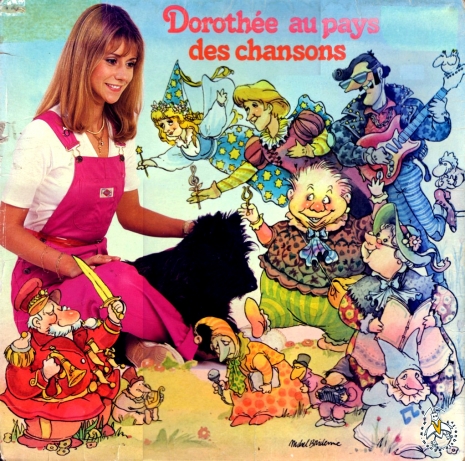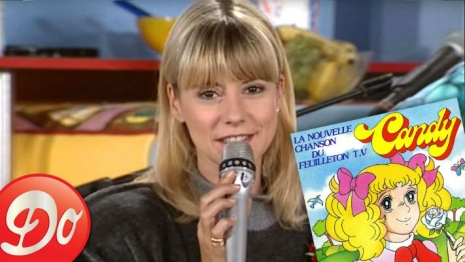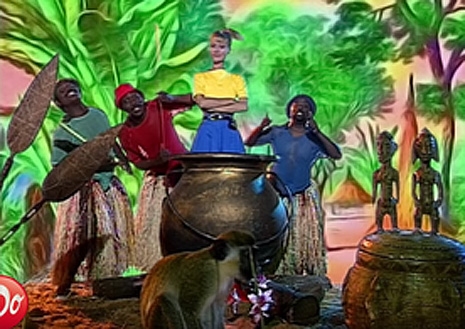
Dorothée is the stage name of Frédérique Hoschedé, the TV host whose hit children’s show Club Dorothée ran in France for ten years. With an insane daily schedule which included a before-school show, an after-school show, and all day long broadcasts on holidays… thousands of kids spent nearly 20 hours a week watching Dorothée on their television sets. Despite the show’s extreme popularity with children, Club Dorothée‘s tight shooting schedule made it nearly impossible for the writers and producers to turnaround any sort of quality, and many teachers, parents, and intellectuals attacked Club Dorothée for being violent, lazy, and even racist programming.
Dorothée received her first break in 1973 when she was asked to host a short children’s program called Dorothée and Blablatus. Blablatus was a skinny, pink, Charles Dickens looking muppet who wore polka dot bow tie and a top hat. Program manager Eliane Victor declared that Dorothée was incompetent for the hosting job and fired her, she then spent the next several years working as a secretary in a plumbing fixture factory, as a waitress, and as a sandwich maker in a supermarket. In 1977 at the age of 24, Dorothée got a second chance at fame when she was hired to host the program Dorothée and her Friends. The show was co-presented by famous French cartoonist Cabu (who sadly became a victim of the January 2015 shootings at the Charlie Hebdo newspaper offices).
In March 1980, Dorothée released her first album Dorothée in the Land of Songs which sold 70,000 copies. She then proceeded to record one album a year from 1982 to 1997. Among her many hits were “Les Schtroumpfs” (a theme for The Smurfs), “Les petits Ewoks,” written for the Star Wars made-for-TV film movie Caravan of Courage: An Ewok Adventure, and “Donjons et dragons” (for the animated television series Dungeons & Dragons based on the role-playing game). “Allo allo monsieur l’ordinateur” (“Hello Hello Mister Computer”) was a tongue in cheek song about asking love advice from a machine and in “La valise” she sang about the items she put in her luggage, and released a new version of the song on every album. For her live concert performances, Dorothée would be joined on stage by actors wearing Ewok costumes.

In 1987, Dorothée and her producers were contacted by rival channel TF1 who offer her a higher budget, attractive salary, and a bigger studio. Club Dorothée immediately became an institution with its wild cartoons, sketches, and games. Children who were members of the studio audience could win a variety of prizes: everything from expensive gifts to series pins and subscriptions to Dorothée magazine. Dorothée presented several music episodes where she sang along with guest stars like Chuck Berry, Percy Sledge, Cliff Richard, and Ray Charles. “I have very good memories, it was non-stop craziness,” she said in an August 2012 interview.
Adults were highly critical of Club Dorothée, they thought games and the sketches were ridiculous, stupid, and noneducational. Channel TF1 purchased a high volume of Japanese cartoons to help fill out the length of each program. These cartoons were poorly dubbed and broadcast without first being reviewed. Many parents found them to be too violent for children, and many complaints were filed to the CSA (the french equivalent of the FCC) after one particular cartoon featured a character wearing a Nazi-like symbol. Viewers also complained about the blatant lack of diversity in the show, pointing out that the only black people ever to have appeared on Club Dorothée were represented by the most archaically outdated stereotypes imaginable, such as a “comedic” dance sequence for a song called “Banania.”

In addition, the actors often complained about the bad sketches and dialogue that were presented to them on a daily basis. “We do not talk like that, the endless sentences that don’t mean anything, the tirades that have nothing to do with anything… we have been legally bound to go along with these scripts that don’t make any sense” said actor Philippe Vasseur. Terrible rumors about Dorothée began spreading in the early days of the internet: that she hated children, had previously acted in pornographic films, and was only interested in making money. As audience viewership and album sales declined, Club Dorothée was finally canceled in August 1997 after a ten-year run. When the show ended, Dorothée disappeared from the spotlight and immediately fell into the “Where are they now?” file.





